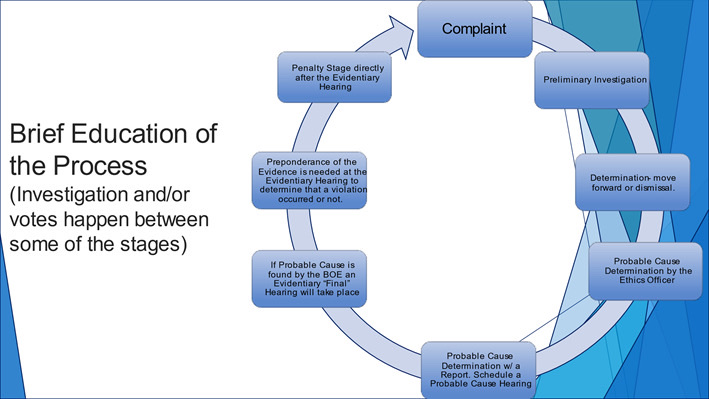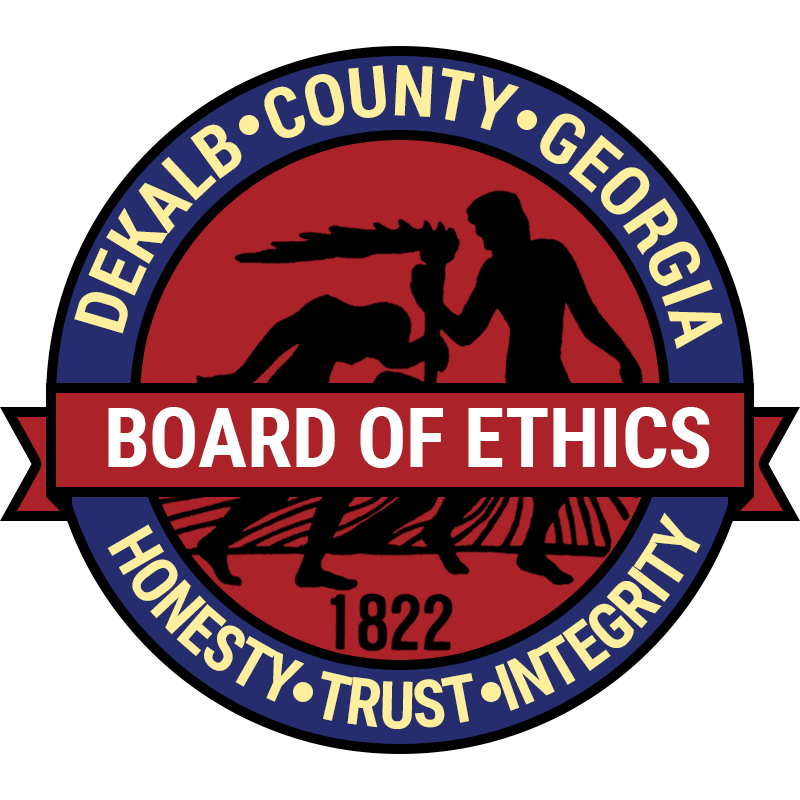FILE A COMPLAINT
Useful Links
Ethics Complaint Process
Jurisdiction
Prior to filing a complaint, please ensure the Board of Ethics has jurisdiction to consider your case. If you have any questions, please contact the Ethics Office to receive advice.
Personal Jurisdiction:
The Ethics Board has jurisdiction over public officials and employees of DeKalb County. The Ethics Board does not have jurisdiction over state public officials or employees nor does the Ethics Board have jurisdiction over employees of other municipalities (including employees and public officials of incorporated cities within DeKalb County). The Ethics Board does not have jurisdiction over private entities or citizens who are not also DeKalb County employees or public officials. Additionally, the Ethics Board does not have jurisdiction over 1) judges and their respective staffs in the following courts, Superior, State, Probate and Magistrate; 2) the District Attorney; 3) the Solicitor and 4) Clerks of the Superior and State Courts and their respective staffs.
Subject Matter Jurisdiction:
The Ethics Board has jurisdiction over the following matters: 1) Conflicts of Interest; 2) Abuses of public office; 3) Inappropriate gifts and gratuities; 4) Misuse of County property; 5) Accounting and audit irregularities.
Overall:
The complainant (the one who files) sends Ethics Complaints through email, United States Postal Service, Ethics Hotline, and via the online complaint form. All complaint notifications shall be sent to the Ethics Administrator, whether they are anonymous complaints or non-anonymous complaints – online or mailed.

Ethics Complaint Steps:
- A complaint has been filed. The complainant is the one who filed the complaint and the respondent is the one accused of an ethical violation.
- The Ethics Administrator sends a copy to the respondent (accused) whether there is jurisdiction or not.
- The Ethics Officer determines the legal issues (jurisdiction, defects in the complaint).
- The Ethics Officer and Ethics Administrator discuss the issues with any new complaint.
- If the complaint contains defects, a letter is sent to the complainant about the defects. A letter should be sent to the respondent to indicate that they have 10 business days to respond once the defect(s) is identified. See Ethics Rule 4.5.
- If the complainant does not respond – the Ethics Officer brings it to the intention of the Board of Ethics.
- If the complaint has not been perfected/corrected the ethics officer shall send a letter to the complainant indicating that dismissal may be recommended. If the complaint has been perfected, the Ethics Officer initiates a preliminary investigation.
- If the preliminary investigation determines that there is an issue, the Ethics Officer shall determine if it is one of the four issues that may lead to dismissal, see Ethics Rules 5.1 and 5.4:
- the Board of Ethics does not have jurisdiction;
- the Board of Ethics has previously considered and dismissed similar allegations;
- the evidence does not support the allegations; or
- the complaint expresses conclusions or opinions without any specific, actionable allegations.
- If it is one of the four issues above, the ethics officer will recommend it to the Board of Ethics. See Ethics Rule 4.6
- If there is no issue with the four issues above, the Ethics Officer will continue her/his investigation and file a Probable Cause Report.
- The Ethics Officer will provide a copy of the Probable Cause Report to the respondent, at least 10 days before the hearing so that they can dispute any portions of the Probable Cause Report. See Ethics Rules 5.6 and 5.7.
- The Ethics Officer will provide a copy of the Probable Cause Report to the Board of Ethics and copy the Ethics Administrator.
- The Ethics Officer will recommend a Probable Cause Hearing.
- If the Board of Ethics agrees that probable cause exists: After hearing arguments and reviewing the probable cause report and response, the Board of Ethics shall determine whether there is probable cause that the respondent violated a section of the Ethics Code. If the Board of Ethics determines that probable cause does not exist, it shall dismiss the. complaint and notify the complainant and respondent of its decision.
- The Ethics Officer will continue the investigation if probable cause has been found.
- After a finding of probable cause, the Board of Ethics shall give notice to the complainant and respondent (usually done by the Ethics Officer) and set the matter down for a public hearing to determine whether a violation of the Ethics Code has occurred. The notice shall state the specific section or sections of the ethics code alleged to have been violated.
- The Ethics Officer shall then place it on the docket for an Evidentiary or Enforcement Hearing, which is also called a Final Hearing. See Ethics Rule 6.1.
- If at the Evidentiary/Enforcement Hearing the Board of Ethics believes that an intentional ethics violation has occurred, after a deliberation and vote, the Board of Ethics shall provide a penalty that same day.
- The complainant or respondent will have 30 days to file for a review/appeal in the DeKalb County Superior Court.
How to File an Ethics Complaint?
Ethics complaints may be filed using any of the resources below:
To file a written complaint, download the DeKalb County Ethics Complaint Form and send it to the Ethics Office by mail, fax, email, or in person to:
DeKalb County Board of Ethics
Ethics Administrator
178 Sams Street
Decatur, Georgia 30030
Fax: 404-371-7083
Email: kwrodgers@dekalbcountyga.gov
Email: kwrodgers@dekalbcountyga.gov
Call the EthicsPoint Hotline: 1-855-224-8216
Written Complaints
To be considered, any written complaint should contain the following information:
- The name and address of the person filing the complaint;
- The name and address of the party against whom the complaint is filed;
- A clear and concise statement of facts on which the complaint is based, including dates, times, places, and actions;
- A general reference to the provisions of the Code of Ethics that apply;
- Any further information that might support the allegations, including the names, phone numbers, and addresses of other persons with knowledge of the facts and any documents that support the allegations; and
- The sworn verification and signature of the person filing the complaint.
Anonymous Complaints
The ethics officer may also receive anonymous complaints that are made in good faith and with sufficient specificity to provide salient and investigable facts. Any complaint should identify the following:
- The person who is alleged to have committed the violation,
- The facts on which the complaint is based,
- The provisions of the ethics code that have been violated, and
- Any evidence that may support the allegations.
Confidentiality and Public Disclosure
Each complaint shall be deemed a separate pending investigation at the time it is reported. While the filed complaint itself will be made available to the public, the investigative file of the Ethics Office will not. The Board’s records and files in any pending investigation are exempt from disclosure under the Georgia Open Records Act. The entire investigative file shall be made publicly available within ten days after the case is either dismissed/closed or a final hearing has taken place before the Board of Ethics.
EthicsPoint is NOT a 911 or Emergency Service:
Do not use this service to report events presenting an immediate threat to life or property. Reports submitted through this service may not receive an immediate response. If you require emergency assistance, please contact your local authorities.

